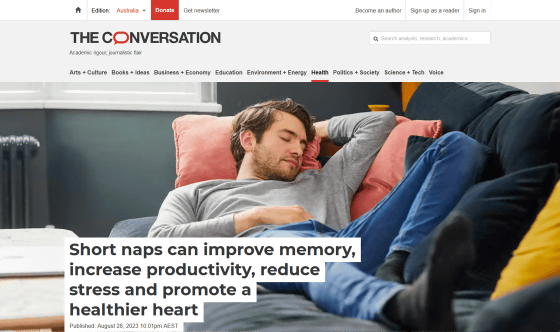A short nap 'power nap' brings various benefits such as improved memory and productivity & stress reduction

In recent years, it has become clear that moderate naps bring various benefits, and short naps are also called '
Short naps can improve memory, increase productivity, reduce stress and promote a healthier heart
https://theconversation.com/short-naps-can-improve-memory-increase-productivity-reduce-stress-and-promote-a-healthier-heart-210449

'Napping during the day is an ancient practice around the world,' Bender said. There are people, but naps can have disadvantages and benefits, ”he points out that naps have not only abundant advantages but also disadvantages.
Many studies have been conducted on the benefits of a nap, and research results that afternoon naps improve cognitive function and memory, and research results that improve alertness, attention, reaction speed, etc. have been reported. Masu. A study conducted by a Chinese research team on people over the age of 60 found that those who answered that they had a habit of taking a nap in the afternoon had significantly higher cognitive performance scores.
Research results that ``regular afternoon naps improve cognitive ability''-GIGAZINE

Short naps are also believed to be associated with improved productivity and creativity, and some companies take naps to boost employee creativity.
The brain is thought to process the information it collects while sleeping, and this is also seen in naps, leading to improved problem-solving and various motor skills . . A small study also found that people who took short naps were less frustrated and impulsive, and were more focused and efficient when performing work-related tasks.
In addition, it has been shown that naps may be associated with reduced stress and reduced cardiovascular risk . This is thought to be because sleep reduces stress hormones in the body and normalizes blood pressure and heart rate.
A study that followed about 7,500 people in Switzerland for up to eight years also found that people who napped once or twice a week had a lower risk of cardiovascular disease.
Studies reveal that napping reduces the risk of heart attack and stroke - GIGAZINE

As mentioned above, naps are known to have many benefits, but Bender also explains the disadvantages of naps. For example, while there are research results that a nap of about 20 minutes improves the subject's mood, a nap of 30 minutes or more is not associated with improved mood or increased happiness.
In addition, a relatively long nap of more than 30 minutes may cause a strong drowsiness and moodiness immediately after waking up, which is called ' sleep inertia .' In general, the longer you nap, the stronger your sleep inertia, which can impair cognitive function for minutes to 30 minutes after waking up, Bender points out. In many cases, the effects of sleep inertia can be minimized by consuming caffeine immediately after a nap.
If you take too long a nap or take a nap late at night, there is also the disadvantage that it will be difficult to fall asleep at night when you should be sleeping. Bender warns that if a forced nap disrupts your regular sleep-wake cycle, it can result in overall sleep deprivation and negative health effects .
In addition, there are research results that in the elderly, a nap of more than 1 hour increases the risk of problems such as increased blood pressure, hyperglycemia, excess body fat, and metabolic syndrome, but the reason for this is not known in detail. “Older people tend to nap more often than younger people, partly because they have trouble falling asleep at night,” Bender said. It may be related to age-related changes in sleep rhythms.'

Bender cites the following points as tips for maximizing the benefits while reducing the disadvantages of napping.
Shorter nap times to avoid sleep inertia and adverse effects on nighttime sleep.
Take a nap as early in the afternoon as possible and finish your nap at least 4-6 hours before bedtime.
・If you suffer from daytime sleepiness, instead of relying only on naps, try to take fundamental measures such as 'reducing caffeine intake', 'maintaining a regular sleep routine', and 'getting enough sleep at night'. Take action.
“Napping should complement a healthy sleep routine, not replace a night’s sleep,” says Bender. You can contribute to a life of power.'

Related Posts:
in Science, Posted by log1h_ik





